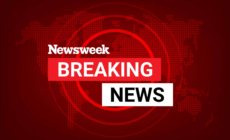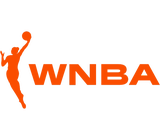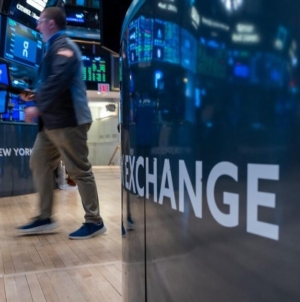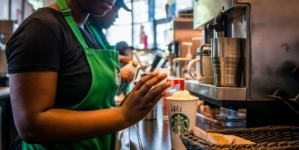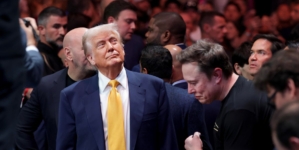-
Hungary signs agreement with North Macedonia to promote Balkan country’s EU integration - 10 mins ago
-
Phillies' Bryce Harper sports blue-colored bat for gender reveal of fourth child - 18 mins ago
-
Who is Jamison Wagner? What We Know About Tesla Arson Attack Suspect - 39 mins ago
-
Orbán meets Erdogan for talks in Antalya - 44 mins ago
-
What are the expectations for Caleb Williams heading into year 2? | Speak - about 1 hour ago
-
Here’s why the Fundamental Law amendment is needed - about 1 hour ago
-
JD Vance Clarifies Stance on Russia, Zelensky: ‘Absurd’ - about 1 hour ago
-
UConn star Paige Bueckers goes No. 1 to Dallas Wings in 2025 WNBA Draft - 2 hours ago
-
Harsh criticism from Standard & Poor’s - 2 hours ago
-
Iran Gives Update on Nuclear Talks with U.S. - 2 hours ago
Consumers now face “tariff surcharges” for some goods as companies pass along costs
The Trump administration’s volley of tariffs has U.S. companies scrambling for ways to absorb — and if possible avoid — the added business costs.
Some enterprises, from small businesses to nationally recognized brands, have already announced higher prices, citing President Trump’s tariffs. Others, from footwear companies to furniture brands, are warning consumers to brace for increased costs.
Amazon CEO Andy Jassy told CNBC Thursday that he expects the tariffs to lead to higher prices on a host of consumers goods, noting that the the site’s third-party sellers are likely to pass on tariff-related costs.
Some consumers are also bracing for impact by by stocking up on goods they think are likely to become more expensive if U.S. “reciprocal levies” on dozens of countries, which are paused for 90 days, take effect.
A 10% tariff on all U.S. imports to the U.S. remains in place. China, which accounts for nearly a third of all goods imported into the U.S., faces levies of up to 145% tariff for some items. In an escalation of the trade war between the world’s two largest economics, Beijing fired back Friday by announcing it will hike duties on American exports from 84% to 125%, deriding Mr. Trump’s tariffs as a “joke.”
Tariff fees on what you buy
Although the tariffs and retaliatory moves by other countries have yet to hit economic growth, U.S. businesses aren’t waiting around. Some are introducing “tariff surcharges,” announcing new prices on their websites and in letters to consumers.
Labucq, which sells high-end footwear that is fabricated in Italy, addressed tariffs and their effect on pricing in a recent social media post. The company said a 20% U.S. tariff on imports from the European Union, which Mr. Trump announced on April 2 before pausing them, would require the company to hike prices by 10% beginning April 15. Labucq said its pricing will then jump by an additional roughly 10% on May 7, noting the increases are necessary for it to “remain sustainable,”
Dame, a sexual wellness brand that makes adult toys and personal care products, has implemented a $5 “Trump tariff surcharge” that is automatically added to customers’ online shopping carts at checkout.
Dame CEO Alexandra Fine said the fee doesn’t cover all of its extra costs and that the company is analyzing its pricing given that most of its products are made in China. “Our whole industry is in China, so we’ve already seen the impact,” she told CBS MoneyWatch.
Fine also said she wants to be transparent with customers about what is happening, rather than quietly inflating prices.
“The intention of adding the Trump tariff surcharge as a line item at checkout was to remind people that this is an extra tax on us. I wanted people to understand why it’s more expensive — that it’s because of political decisions that were made,” she said.
Other companies are also moving to raise prices. In a quarterly earnings call last month, a senior executive with U.S. chipmaker Micron said some of its products will be subject to higher U.S. tariffs on Canada, Mexico and China and that it plans to “pass those costs along to our customers.”
Honeywell Building Automation, which designs safety and efficiency systems for buildings, in early March announced new pricing related to fresh tariffs on China, Mexico and Canada. The company started applying a 6.4% “tariff surcharge” on its building management systems, excluding software and subscription services, saying the move was necessary “to mitigate the impact of tariffs.” Honeywell also said it would eliminate the extra duty “as soon as such tariffs are no longer in force.”
Lemonade out of lemons
Other companies are using the situation as a promotional tool. While it’s true that consumers could eventually pay more if they wait to purchase furniture, electronics, automobiles and more, “pre-tariff sales” play into consumers’ fear that prices could rise sooner than later and can be an effective way to boost sales, according to experts.
“The tariffs are injecting uncertainty into the marketplace and when there is high uncertainty, consumers tend to overestimate their losses, so they try to hedge their losses as much as possible in a very irrational way,” Denish Shah, professor of marketing at Georgia State University’s Robinson College of Business, told CBS MoneyWatch.
And in times of market uncertainty, explains Denish, consumers are prone to panic-buying.
“They tend to stockpile necessities, fearing that tomorrow, suddenly, prices could go up. So they’ll say, ‘Let me try to accelerate all the purchases I can that I would have made anyway,'” he said.
That said, the overarching goal of consumers, particularly after battling years of relentless inflation, is to save money. “Consumers are very price-sensitive in this environment, so they are going to react very strongly to sales that companies are promoting,” Shah added.
The pre-tariff sales strategy is already working for some sellers, such as Burlap & Barrel, a spice company that imports single-origin spices from around the world. The company sources ingredients from small farms in Guatemala, Iceland, India, Spain, Turkey, Vietnam and more. Over the weekend, the spice importer announced an a “spring cleaning-turned-impromptu Tariff sale,” marking down all products by 20%, through Tuesday.
“When we planned this sale, we thought it’d be a routine springtime promotion, but in the last few days it has turned into something very, very different,” Burlap & Barrel wrote in a social media post. The company said that it’s waiting to see how tariffs are applied to its products, but it’s sure that they “will be bad for our business,” given that it cannot easily overhaul its supply chains.
The company states that it is running the sale “To show that we’re serious about not raising our prices, and to finance another year or purchasing from smallholder farmers in the face of economic instability and political crisis.”
Large chains are putting their own spin on tariff-related promotions. Furniture maker Raymour & Flanigan is urging customers to “lock in pre-tariff pricing” in a banner on its website. The company does not indicate what kind of price hikes it could implement in the future, though, as a result of the new levies.
Source link






